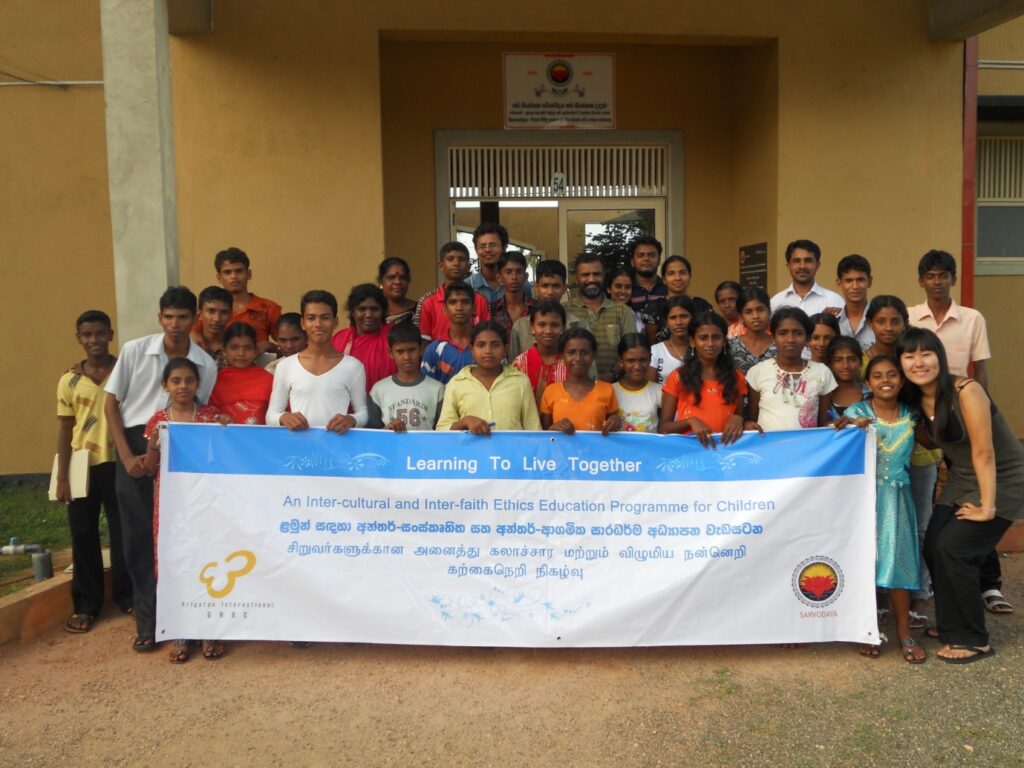GENEVA, Switzerland – Early November, theSarvodaya Shramadana movement, Sri Lanka’s largest people’s organisation and the representative of the Global Network of Religions for Children in this country, reported its use of the Learning to Live Together manual in a year-long peacebuilding programme for youth. After the 30-year armed conflict in Sri Lanka, the government in 2009 took control over all areas controlled by the rebels, but today much is still needed to develop a peaceful and united nation that truly appreciates its cultural and ethnic diversity, the report says.Read more… The long period of conflict developed racial isolation in Sri Lanka and created mistrust among different ethnic communities. Many Sinhala children have never interacted with Tamil children of the Hindu tradition. The extended period of conflict has given birth to a generation who has not seen and experienced a united Sri Lanka where people live in harmony.
In tackling this issue and moving forward towards a positive future for all Sri Lankans, it appears essential that people learn to live together by developing skills and attitudes for this purpose. The younger generations in particular need to be given the space and the opportunity to rebuild relationships across the ethnic divide and unite for the betterment of their shared future.
For 2010-2011, the GNRC Ethics Education programme was revised taking into account the change in the socio-political reality and visible need for young persons to develop competencies related to peaceful living. The new objectives are to engage youth in intercultural and interfaith peacebuilding through the Learning To Live Together Ethics Education programme; to empower youth groups for social activism under the ‘Youth for Peace’ umbrella, educate children and youth on the rights of the child, empowering them as peer educators.
In Sri Lanka, Sarvodaya was implementing the GNRC Ethics Education Programme for 2010/11 across seven selected districts all in different provinces of Sri Lanka, engaging a total of 35 groups of 25 children representing all four main faith groups and the three main ethnic groups in Sri Lanka. Districts for implementation were selected considering high occurrence of child abuse, interest and commitment of district staff, ethnic diversity, geographical diversity and the continuity of previous GNRC work.
As part of the main activities under the programme a Training of Facilitators Workshop for programme volunteers and a workshop each on Ethics Education for Children in the seven selected districts have been completed.
 Following the first round of workshops organized under the programme the participating children’s groups have been organizing activities in their communities towards building a better society. These include inter-faith visits, spiritual moments, cultural shows, shramadana (gifting of labour for community work), etc.
Following the first round of workshops organized under the programme the participating children’s groups have been organizing activities in their communities towards building a better society. These include inter-faith visits, spiritual moments, cultural shows, shramadana (gifting of labour for community work), etc.
The progamme has received positive feedback from the children and their local communities. For many of the children participating it was a first time experience to interact with children from other ethnicities in such a close manner and to be able to share and learn with them. The content and the methodologies covered through the Learning to Live Together toolkit was highly relevant and took the children through a deeper reflection process than their regular education at schools. They were provided a more free space to express themselves.
Next up in the programme as a follow up to the district level workshops, a national level workshop is scheduled for 21-23 December to bring together 10 representatives from each of the seven districts for a three Leadership and capacity development workshop titled ‘Children for Peace’. Whilst the main focus is on developing the capacity and leadership of the children’s groups the workshop will also develop tangible skills, leadership and inspire children in their work.
